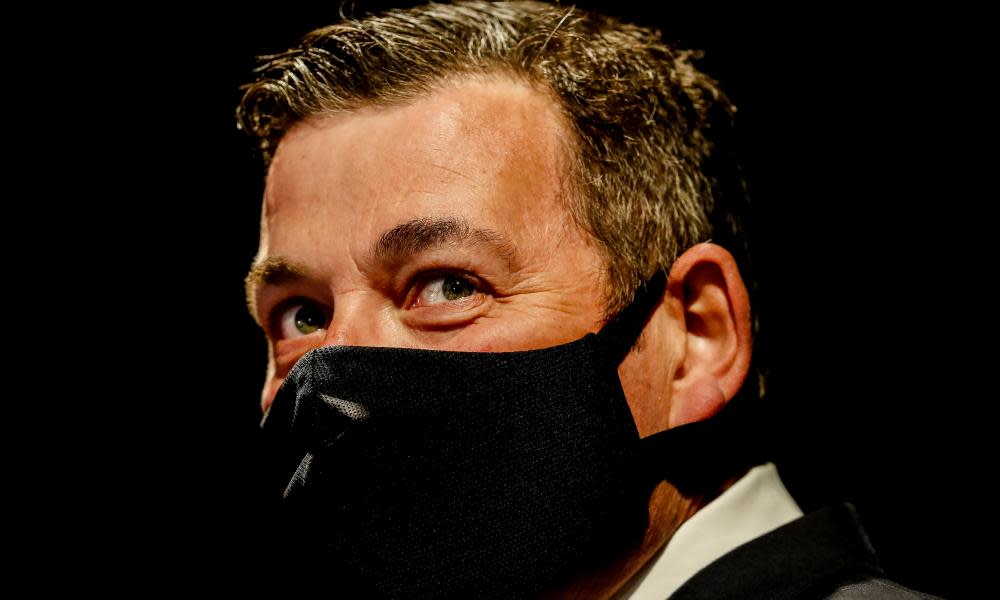Victoria Covid update: sweeping law changes to give premier power to declare pandemics

The Victorian government will introduce new laws that will give the premier sweeping powers to declare pandemics and enforce public health orders for three months at a time.
Premier Daniel Andrews has defended the legislation, to be tabled in parliament on Tuesday, that would strip the chief health officer of their power to have a final say on restrictions.
Andrews said the new laws are based on New Zealand legislation, and would include an independent oversight committee consisting of public health and human rights experts to review any future public health orders.
Related: Inside Melbourne’s Park hotel, refugees sit and wait for Covid to find them
“We made a commitment some time ago that we will introduce pandemic specific laws, that we will have a set of measures that were not written with a hypothetical in mind,” Andrews said.
“That is exactly the framework that we have introduced into parliament. This is modelled on the New Zealand law, there are elements of what happens in New South Wales and other states also.
“We will continue to talk with the crossbench, as we always do, and negotiating in good faith, and having these arrangements in place well before those that are currently in place expire.”
Andrews said the new laws were justified as Victoria moved towards living with Covid. He also said it was important to safeguard the state against future pandemics.
“They also set us up, having learned many different things across the journey, for whatever that next pandemic might look like, whenever that might be into the future.”
The laws will outline measures around quarantine and booster shot programs, as well as introducing safeguards around contact tracing and QR code information.
It comes as the state recorded 1,510 new Covid cases and four deaths. The current state of emergency is due to expire on 15 December.
Victorian health minister Martin Foley backed the premier, saying that a system of checks and balances will be built into the new laws, including the introduction of the independent oversight committee.
“A statement of reasons for these decisions to make pandemic orders, together with the chief health officer’s advice, and how each order affects human rights under the Charter of Human Rights and Responsibilities, must be published within 14 days of making of those orders.”
Any advice made by the independent oversight committee will also need to be tabled in parliament.
Chief health officer Brett Sutton said he did not feel sidelined by the plan, and admitted it was a “heavy burden” to have his current powers.
“It’s the case for any jurisdiction in Australia that it’s a parliament to make the laws the population works under,” he said.
“I think there are expectations that the elected representatives in parliament, the minister, in particular the premier, should have accountability for the final form that public health directions take.”
It comes as Victorian opposition leader Matthew Guy accused the Andrews government of overreach, calling the new laws “the most extreme” pandemic legislation in the country.
Email: sign up for our daily morning briefing newsletter
App: download the free app and never miss the biggest stories, or get our weekend edition for a curated selection of the week's best stories
Social: follow us on YouTube, Facebook, Instagram, Twitter or TikTok
Podcast: listen to our daily episodes on Apple Podcasts, Spotify or search "Full Story" in your favourite app
“Placing so much power in the hands of one person … would be unprecedented.
“We see these laws as an incredible attack on democracy, usurping the parliament, usurping the cabinet process, which is what exists in NSW, and then allowing the premier to effectively rule by decree, for months on end.
“In short, this bill is the most extreme of its kinds that we’ve seen in Australia. While a pandemic requires different approaches, it doesn’t require a law as extreme as this.”
But Foley dismissed concerns, saying the opposition had been peddling “conspiratorial nonsense” and becoming “increasingly hysterical” in discussions around the government’s pandemic response.
“Their contributions are increasingly hysterical, not informed by the evidence, and increasingly silly.”

 Yahoo Movies
Yahoo Movies 
